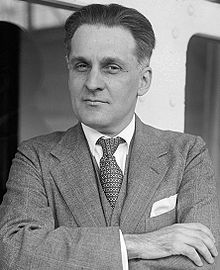Antoine Bibesco
| Antoine Bibesco | |
|---|---|
 |
|
| Envoy Extraordinary and Minister Plenipotentiary of Romania in the United States | |
|
In office February 25, 1921 – February 24, 1926 |
|
| Prime Minister |
Alexandru Averescu Take Ionescu Ion I. C. Brătianu |
| Preceded by | N. H. Lahovary |
| Succeeded by | F. Nano |
| Envoy Extraordinary and Minister Plenipotentiary of Romania in Spain | |
|
In office 1927–1931 |
|
| Prime Minister |
Vintilă Brătianu Iuliu Maniu Gheorghe Mironescu |
| Personal details | |
| Born |
July 19, 1878 Paris |
| Died | September 1, 1951 (aged 73) |
| Resting place | Paris |
| Spouse(s) | Elizabeth Asquith |
| Relations | George Valentin Bibescu |
| Children | Priscilla Bibesco (1920–2004) |
| Profession | Diplomat |
| Religion | Eastern Orthodoxy |
Prince Antoine Bibesco (Romanian: Prinţul Anton Bibescu) (July 19, 1878 – September 2, 1951) was a Romanian , lawyer, diplomat and writer.
His father was Prince Alexandre Bibesco, the last surviving son of the hospodar of Wallachia. His mother was Helene Epourano, daughter of a former Prime Minister of Romania. Though raised at 69, Rue de Courcelles, in Paris, Antoine continued to oversee the Bibesco estates in Craiova until after World War II.
As a young man, his mother, Princess Hélène Bibesco's celebrated Paris salon gave him the opportunity to meet Charles Gounod, Claude Debussy, Camille Saint-Saëns, Pierre Bonnard, Édouard Vuillard, Aristide Maillol, Anatole France and Marcel Proust among many other notables. Both his father and mother commissioned artworks and music (most notably Edgar Degas and George Enescu) and Antoine continued this family tradition, particularly through his friendship with Vuillard.
Marcel Proust became a lifelong friend and shared a secret language in which Marcel was Lecram and the Bibescos were Ocsebib. Antoine made a concerted effort to have Proust's Du Côté de Chez Swann (in which, it is said, Bibesco was the model for Robert de St. Loup) published by André Gide and the Nouvelle Revue Française, but failed in that effort. Toward the end of Proust's life, Bibesco, who was a great raconteur, was an outside ear for the reclusive writer. Later he published Letters of Marcel Proust to Antoine Bibesco.
...
Wikipedia
